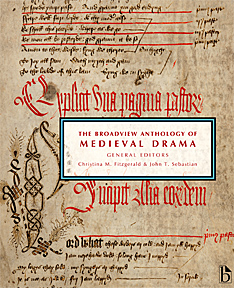This anthology is the first of its kind to present all included works in modern English spelling and translations for use in education. It is co-edited by Dr. Christina Fitzgerald, UT associate professor of English, and Dr. John Sebastian, associate professor of English at Loyola University New Orleans.
The dramas featured in this anthology come from the period between the 10th and 16th centuries and are presented in modernized spelling or fully translated from multiple languages such as Latin, Cornish, Welsh and French. The English works, written in the historical form of Middle English, include phrases and words no longer used that have been glossed and footnoted.
 Until now, anthologies that included these works would present English plays in their original, unmodernized spelling, making them difficult to teach in a classroom setting.
Until now, anthologies that included these works would present English plays in their original, unmodernized spelling, making them difficult to teach in a classroom setting.
“What we wanted to do with our anthology was to make it more student-friendly and make it friendlier to people in theater who do actual performances as opposed to only literary students,” Fitzgerald said.
The anthology took three years of work by Fitzgerald, Sebastian and contributing editors who wrote many of the play introductions and provided many of the translations and edited texts. Fitzgerald had been a contributing editor in previous works by the Broadview Press, and she was chosen for this anthology because of her expertise in the area.
She studies and teaches a wide range of medieval drama and literature, and enjoys the subject for a number of reasons, including its diversity of forms. One of her favorite genres outside of drama is the “dream vision,” in which poets present themselves as dreamers and relate imaginative narratives that work much like actual dreams do.
Similarly, medieval drama interests Fitzgerald because it is a genre that had to re-invent itself in the Middle Ages — making it very diverse in terms of writing and performance. Medieval dramas were written before the use of fixed stages and permanent playing places in England, so they were performed in streets, churches, great halls and other locations.
“There was a great variety of drama in the Middle Ages,” Fitzgerald said. “It’s all very different, whereas when you think about modern theater, you don’t think of it happening all over the place.”